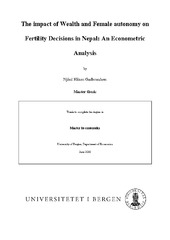| dc.description.abstract | The last fifteen years, the fertility rate in Nepal has declined significantly. In the same period, the country has, despite political unrest and a civil war, experienced economic growth. Nepal has, contrary to its neighboring countries, India and China, not used legal action to limit its population growth. The fertility rate in Nepal is now below India's rate, and is reaching the replace rate. In this thesis I explore the role of families' wealth and female autonomy in determining individual fertility. Using cross sectional household data from 2006 I test the effect of wealth, female autonomy and other socioeconomic status on number of children. Except from wealth and female autonomy, emphasis is put on the strong preference for boys in the Nepalese society. Preference for boys is tested using gender of first child as a natural experiment. The theoretical foundation is based on Gary Becker's work, where there is assumed a trade-off between the number of children and human capital invested in them.Ordinary Least Squares and Poisson Regression is applied, and the results are calculated and presented using STATA. My findings suggest that female autonomy is an important determinant of individual fertility; households where the husband has relatively more intra-household power get significantly more children compared to other groups. Wealth and education is also important determinants, but the effect of female education is only significant for low levels of education. Preference for boys is present, and this might have consequences, as sex-selective abortions are a potential threat when son-preferences are accompanied by decreasing fertility. | en_US |
